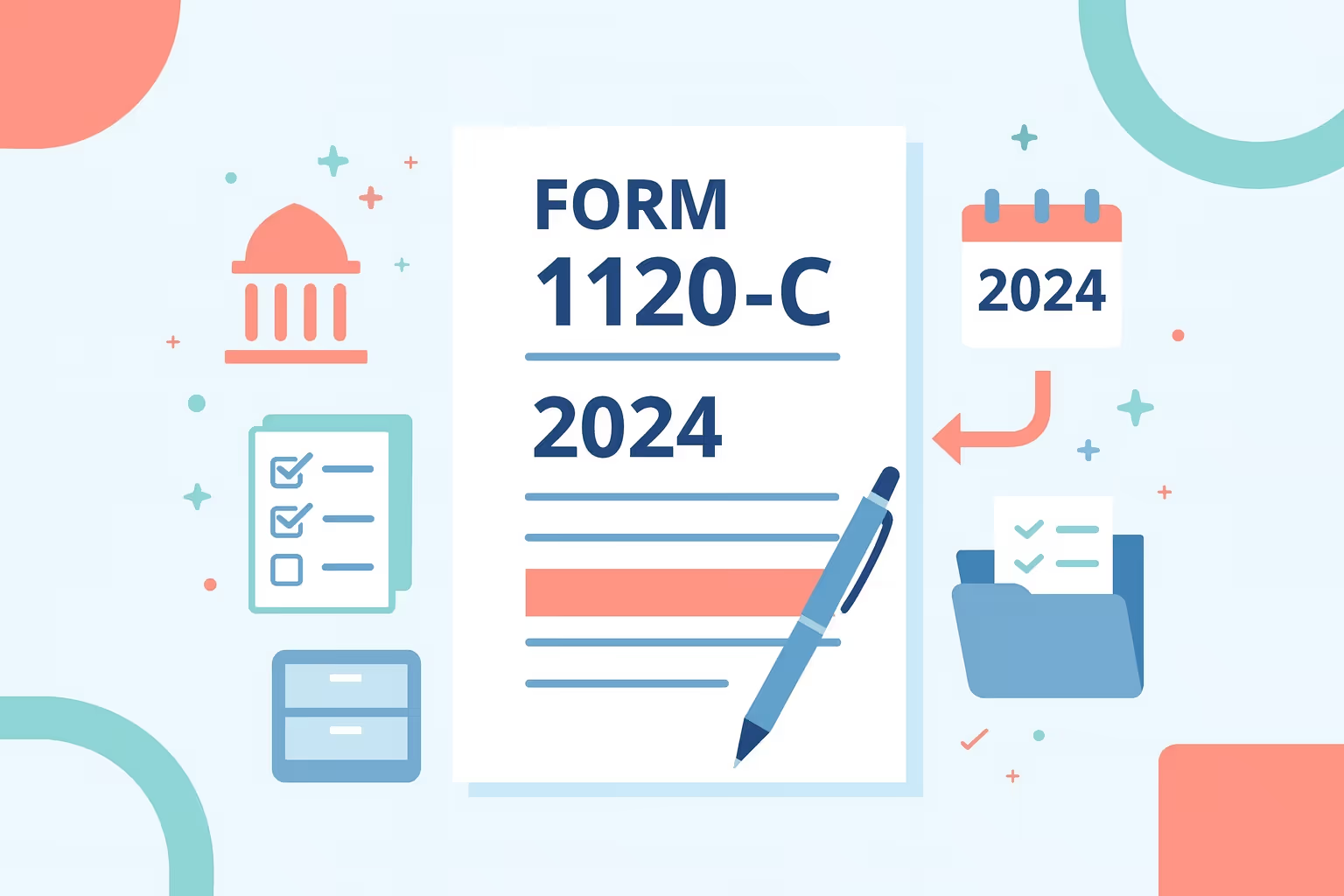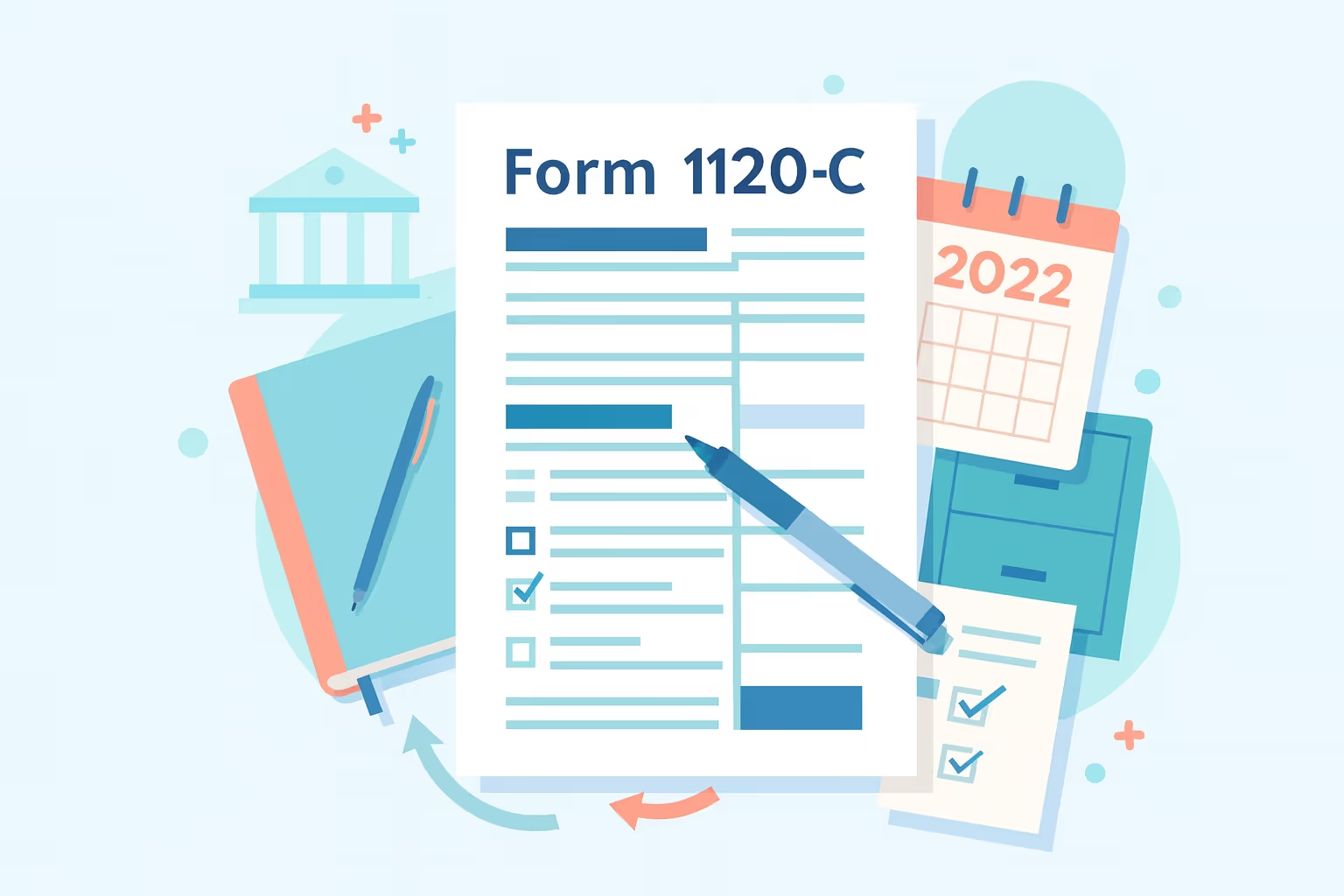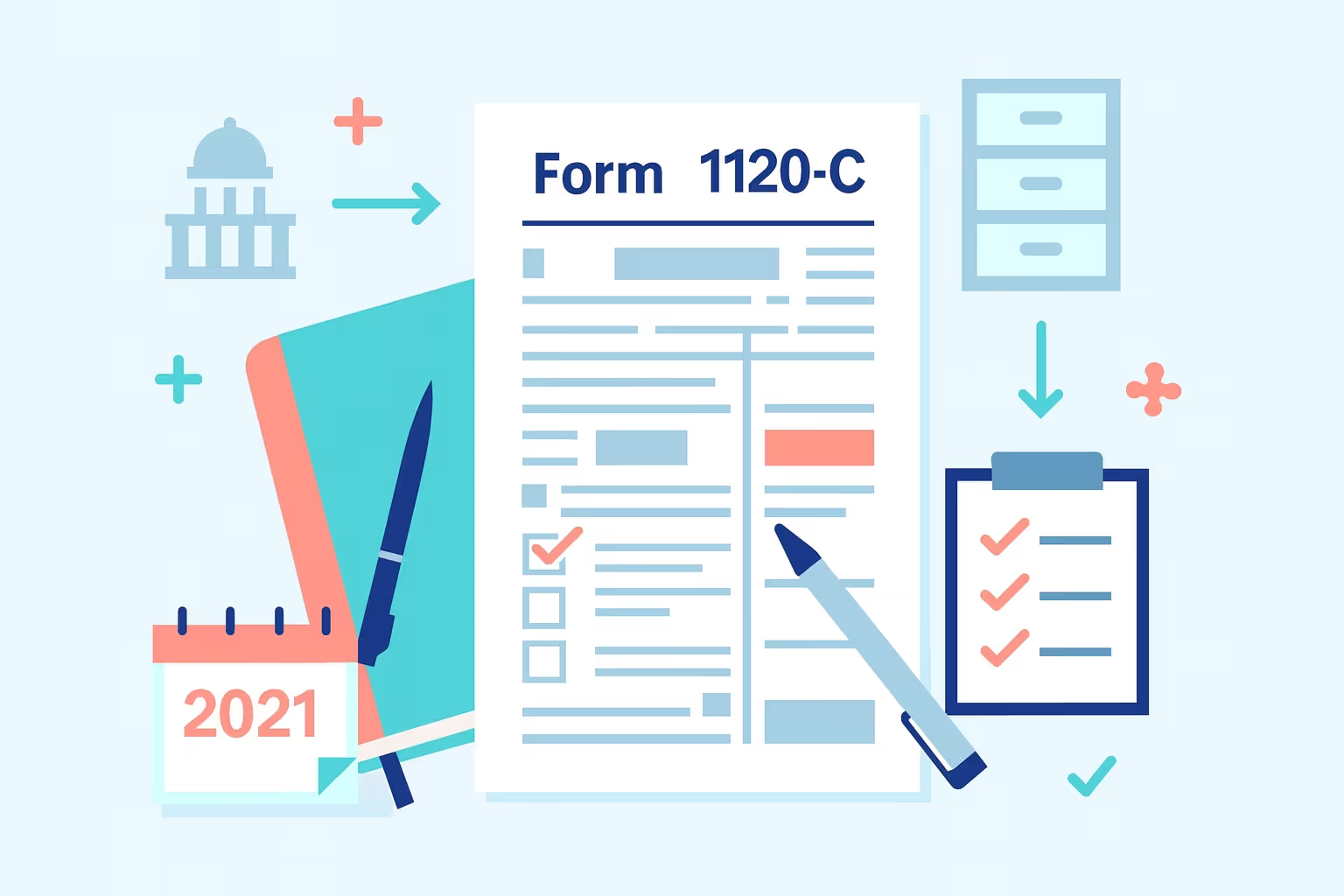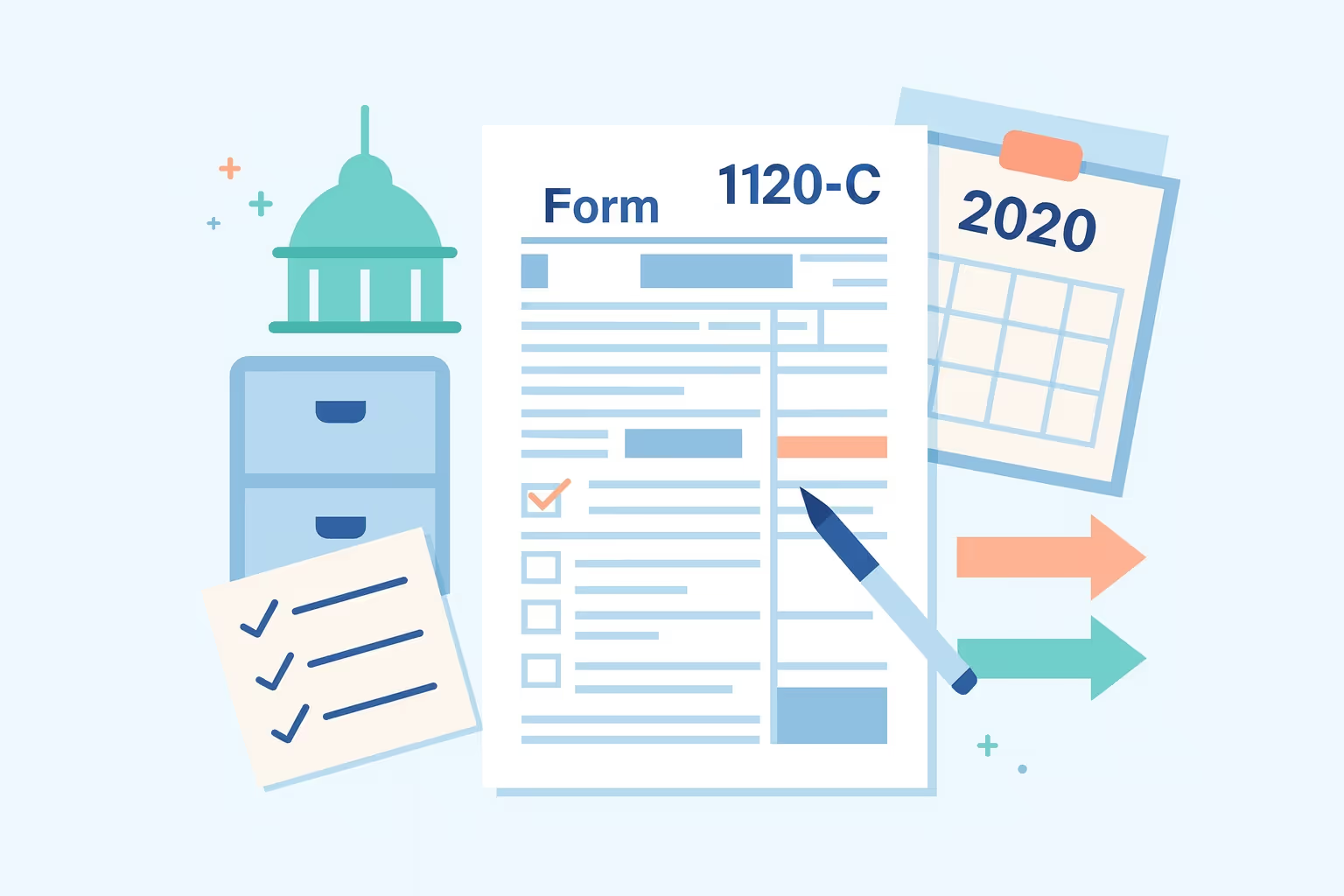
Form 1120-C is the official income tax return required by the Internal Revenue Service for cooperative associations under subchapter T of the Internal Revenue Code. It applies to farmers’ cooperatives, credit unions, supply cooperatives, housing cooperatives, and other corporations operating on a cooperative basis. Each cooperative must accurately report its income, deductions, and credits to calculate its total tax and income tax liability for the applicable tax year. This process enables eligible taxpayers to claim tax benefits while ensuring compliance with federal reporting standards.
Cooperatives subject to these regulations must determine whether they qualify as tax-exempt or taxable under the Internal Revenue Code. The Internal Revenue Code requires both active and dormant cooperatives that allocate amounts to patrons to file Form 1120-C. These entities often issue patronage dividends and per-unit retain allocations, which must be fully documented and accurately reported. Every cooperative must review its financial activity to ensure that all figures reflect accurate accounting records and conform to IRS filing requirements.
According to the official 2011 IRS Form 1120-C Instructions, filers must complete each line item, schedule, and attachment with precision to meet federal compliance standards. This guide simplifies those requirements, helping cooperative associations prepare a complete return and fulfill every IRS obligation confidently.
Who Must File Form 1120-C and Key Eligibility Rules for Cooperative Associations?
Filing Form 1120-C is a legal obligation for every corporation operating on a cooperative basis under subchapter T of the Internal Revenue Code. A cooperative association qualifies for this requirement when it allocates income, deductions, or credits to patrons based on business conducted with or for those patrons.
Each filer must determine whether it operates as a taxable or a farmers’ cooperative with tax-exempt status under section 521. Proper classification ensures compliance and accurate tax and income tax liability reporting.
Cooperatives subject to this requirement include a range of organizations engaged in member-oriented activities. These entities often distribute patronage dividends or per-unit retention allocations, reflecting member participation.
To confirm eligibility, the Internal Revenue Service evaluates cooperative activities, allocations, and ownership structures. Every cooperative must ensure that its accounting records align with the definitions outlined in the Internal Revenue Code and accurately reflect its business earnings and profits.
Organizations Required to File
- Farmers’ cooperatives must file regardless of whether they owe tax, as they receive special tax treatment under section 521.
- Marketing cooperatives sell products or services on behalf of members and allocate earnings to patrons.
- Supply cooperatives provide goods or materials to members and record transactions tied to patron purchases.
- Credit cooperatives operate as financial institutions that offer credit or banking services on a cooperative basis.
- Housing cooperatives offer residential properties to members through patronage arrangements.
- Consumer cooperatives are retail organizations collectively owned and operated to supply goods or services to consumers.
Organizations Not Required to File
- Insurance companies governed under subchapter L are excluded from Form 1120-C filing requirements.
- Mutual savings banks operating under subchapter H must follow different corporate return provisions.
- Exempt organizations recognized under chapter 1 of the Internal Revenue Code, aside from section 521 cooperatives, are not required to file.
- Rural utility providers supplying electric or telephone service to rural areas under federal programs are not required to file Form 1120-C.
The IRS Corporations page outlines the broader classification standards for corporate filers, guiding the selection of the proper tax form. Each cooperative should evaluate its organizational documents, revenue structure, and membership agreements before filing to ensure accurate representation.
Understanding who must file Form 1120-C protects both the cooperative and its patrons. Accurate classification prevents delays, IRS correspondence, or amended returns and supports long-term compliance. Maintaining accurate records and confirming eligibility each tax year ensures consistent adherence to federal reporting requirements, strengthening the cooperative’s credibility with the Internal Revenue Service.
Reporting Income, Gross Receipts, and Goods Sold
Accurate reporting of gross receipts and goods sold is essential to determine a cooperative’s taxable income and total tax liability. Every corporation operating under subchapter T of the Internal Revenue Code must disclose income earned from all sources within the tax year.
Each figure entered on applicable lines should match the cooperative’s financial records to ensure accurate computation of income tax liability. Inaccurate reporting in this section can affect deductions, credits, and overall compliance with Internal Revenue Service requirements.
Gross Receipts and Adjustments
Gross receipts represent the total earnings from selling goods, services, or other business activities. Cooperatives must include all amounts received before subtracting costs or allowances. The return must reflect the full revenue generated from transactions with patrons and nonpatrons conducted cooperatively.
Adjustments, such as returns and allowances, are made to accurately present net sales by reducing total receipts. Cooperatives should maintain detailed records of all business transactions, including supporting invoices and receipts, to verify reported amounts and substantiate income calculations during review.
Cost of Goods Sold
The cost of goods sold (COGS) represents the total expenses incurred to produce or purchase the products or inventory sold during the tax year. Cooperatives must calculate COGS using Form 1125-A and ensure that each cost component aligns with the organization’s financial records.
Expenses include beginning inventory, direct labor, materials, and freight charges directly tied to sales. Only expenses directly associated with producing goods are deductible; unrelated operating costs must be reported on other applicable lines of the return. Accurate COGS reporting ensures the cooperative’s taxable income reflects its actual cost of goods sold.
Other Income Categories
Cooperatives must report all other sources of income to provide a complete picture of financial activity. Additional categories may include interest income from deposits with a financial institution, dividends received, rental income, royalties, and gains from the sale of capital assets.
Each income type must be reported on the applicable lines of Form 1120-C, with supporting schedules attached as necessary. Allocating amounts correctly between patronage and nonpatronage sources ensures compliance with cooperative reporting rules and the Internal Revenue Code.
Comprehensive income reporting helps ensure the cooperative’s return accurately reflects financial performance and aligns with federal tax regulations. A detailed review of gross receipts, adjustments, and cost allocations supports credible documentation for future audits.
Consistent and precise reporting strengthens the cooperative’s credibility with the Internal Revenue Service and helps maintain its eligibility for available tax benefits and deductions. Maintaining transparency across all income categories protects the organization and its patrons from corrections or amended filings.
Deductions, Per-Unit Retain Allocations, and Patronage Dividends
Deductions play a critical role in reducing a cooperative’s taxable income and accurately determining its total tax liability. Each deduction must align with the cooperative’s business purpose and reflect expenses incurred during the tax year under subchapter T of the Internal Revenue Code.
Cooperatives subject to these provisions may qualify for specialized deductions recognizing their member-based structure. Careful reporting supports compliance with federal regulations and preserves the eligibility for specific cooperative tax benefits.
Cooperatives operating cooperatively must separate ordinary business deductions from specialized allocations unique to their structure. The Internal Revenue Service requires precise reporting of income and expenses distributed to patrons through per-unit retain allocations and patronage dividends.
These allocations show how the cooperative distributes earnings to members and maintains transparency in treating qualified written notices and other property. Proper classification prevents misstatements that could affect the cooperative’s income tax liability.
- Ordinary and necessary business expenses include payments for wages, rent, supplies, advertising, taxes, and depreciation that directly support operations.
- Per-unit retain allocations represent payments made to patrons based on the quantity or value of products they deliver or market through the cooperative.
- Patronage dividends reflect earnings distributed to patrons based on business conducted during the year.
- Nonpatronage deductions apply to income derived from activities not directly tied to patron transactions.
- Charitable contributions and public benefit payments may be deductible from taxable income when they meet statutory limits and documentation standards.
- Employee benefit programs typically include contributions to retirement plans, health coverage, and other welfare benefits, provided they are appropriately documented.
Deductions and allocations reflect both the cooperative’s financial structure and its obligations to patrons. Cooperatives must list each category on the applicable lines of Form 1120-C and attach the appropriate schedules. Accurate reporting fosters transparency and ensures compliance with federal standards.
Maintaining meticulous records for every deduction and allocation ensures the cooperative benefits from all eligible reductions and demonstrates compliance with Internal Revenue Service regulations.
Payment Deadlines, Estimated Tax Payments, and EFTPS Enrollment
Timely tax payments are crucial for every cooperative association that reports income under subchapter T of the Internal Revenue Code. The Internal Revenue Service requires corporations operating collaboratively to meet all deadlines for estimated tax payments, ensuring accurate credit for their total tax liability. Every cooperative must plan, use the correct payment method, and verify each transaction through secure systems managed by the Department of the Treasury and the Bureau of the Fiscal Service.
Step 1: Identify the Payment Due Date
Cooperatives filing Form 1120-C must pay their income tax liability no later than the 15th day of the 9th month after the end of their tax year. For calendar-year filers, the deadline falls on September 15. Organizations operating on a fiscal year schedule should calculate deadlines based on their year-end month. Meeting each due date ensures full compliance with Internal Revenue Code requirements.
Step 2: Calculate Required Installments
Cooperatives must make quarterly estimated tax payments if they expect to owe $500 or more in total tax for the year. Cooperatives must calculate each installment as 25 percent of the lesser of the current year’s expected liability or the prior year’s tax. Proper calculation prevents underpayment and ensures steady progress toward meeting the annual obligation.
Step 3: Access and Enroll in EFTPS
The Electronic Federal Tax Payment System (EFTPS), managed through the IRS EFTPS System, offers secure online access for all federal tax payments. Cooperatives must provide a valid Employer Identification Number, a mailing address, and contact details for authorized users during the enrollment process. After registration, users receive a personal identification number and activation code through official correspondence.
Step 4: Enable Secure Access
To safeguard transactions, EFTPS utilizes multifactor authentication and encryption features, which are indicated by a locked padlock icon during login. Cooperatives must keep login credentials private and update email notifications to confirm each payment. Security best practices help ensure all deposits reach the Internal Revenue Service without delay or duplication.
Step 5: Schedule and Confirm Payments
Payments must be scheduled at least one to two business days before the due date. Early scheduling provides time to verify and correct potential errors. Upon processing, EFTPS sends confirmation through email notifications, providing verifiable proof of payment submission.
Accurate scheduling and timely deposits reinforce compliance with federal tax laws. Following these steps ensures payments are applied correctly and protects the cooperative’s standing with the Internal Revenue Service. Consistent use of EFTPS streamlines payment management, offering security, convenience, and transparency for every reporting period.
Preparing Schedule C, Balance Sheets, and Additional Information
Cooperatives filing Form 1120-C must complete several schedules and disclosures that accurately present their financial position and support the figures reported throughout the return. Each attachment must align with Internal Revenue Code requirements and reflect proper accounting for income, deductions, and allocations. Careful preparation enables the Internal Revenue Service to verify the cooperative’s financial integrity and compliance with federal tax laws and regulations.
Schedule C
- The cooperative reports dividends received and related deductions for both domestic and foreign corporations.
- The schedule requires identification of each payer, the amount of dividends received, and the applicable deduction percentages.
- These entries affect taxable income and total tax liability by accurately reporting qualified amounts.
- The cooperative must include supporting statements to substantiate dividend sources and ensure transparency during review.
Balance Sheets
- The balance sheets summarize the cooperative’s financial position at the beginning and end of the tax year.
- They list assets, liabilities, and retained earnings consistent with the organization’s general ledger.
- The cooperative must reconcile its balance sheets with financial statements to avoid discrepancies or filing delays.
- Each balance sheet must reflect consistent accounting methods and include documentation supporting every reported value.
Affiliations Schedule
- The affiliations schedule identifies ownership interests and relationships with other entities.
- It applies to cooperatives with multiple business lines, subsidiaries, or affiliations with financial institutions.
- The cooperative must include names, addresses, Employer Identification Numbers, and ownership percentages for each entity.
- This schedule ensures compliance with ownership reporting requirements and demonstrates transparency in group filings.
Additional Information
- The cooperative discloses supplementary data not reported elsewhere, such as changes in elections or accounting methods.
- This section details nonpatronage income, capital adjustments, or other operational disclosures.
- Comprehensive reporting in this section enhances the cooperative’s return and provides a complete picture of its financial activities.
- The cooperative must retain backup documentation to support every entry in case of a potential Internal Revenue Service examination.
Each schedule contributes to an accurate financial presentation of the cooperative’s operations and ensures adherence to the Internal Revenue Code. Thorough preparation and complete disclosure foster trust with the Internal Revenue Service, minimize audit exposure, and demonstrate the organization’s commitment to regulatory compliance. Proper documentation supports transparency in future tax years and reinforces credibility across reporting activities.
Filing Consolidated Returns and Cooperative Group Reporting
Some cooperative associations operate within affiliated groups, requiring specialized reporting procedures when filing Form 1120-C. A consolidated return enables eligible corporations operating under common ownership to report their combined income, deductions, and credits on a single tax return.
Each affiliated member must meet the Internal Revenue Code requirements and maintain accurate documentation that reflects ownership, financial relationships, and shared transactions. Consolidated filing can streamline reporting for groups that share management, capital, or operations while preserving transparency for the Internal Revenue Service.
The table below compares the key features of consolidated and single-entity filings to assist cooperatives in determining the appropriate reporting method for their structure:
Consolidated Return Filers vs. Single Entity Filers
Eligibility
- Consolidated Return Filers: Affiliated corporations operating under common control and meeting ownership thresholds.
- Single Entity Filers: Independent cooperatives without affiliated subsidiaries.
Primary Form
- Consolidated Return Filers: File Form 1120-C with Form 851 (Affiliations Schedule) attached.
- Single Entity Filers: File a standalone Form 1120-C.
Reporting Approach
- Consolidated Return Filers: Combine income, deductions, and credits across all entities within the group.
- Single Entity Filers: Report individual income and deductions separately.
Ownership Disclosure
- Consolidated Return Filers: Must provide a detailed listing of each affiliate’s name, address, EIN, and ownership percentage.
- Single Entity Filers: No ownership reporting beyond the single cooperative.
Tax Computation
- Consolidated Return Filers: Compute total tax on combined taxable income; credits are shared under specific regulations.
- Single Entity Filers: Tax is based solely on the cooperative’s individual taxable income.
Intercompany Transactions
- Consolidated Return Filers: Must eliminate duplicative income, expenses, and allocations between affiliates.
- Single Entity Filers: Not applicable—transactions remain within one entity.
Schedule Requirements
- Consolidated Return Filers: Must include Form 851 and any supporting schedules showing allocations between entities.
- Single Entity Filers: Attach only schedules relevant to a single filer.
Recordkeeping
- Consolidated Return Filers: Maintain records demonstrating common ownership and control, including documentation for combined entries.
- Single Entity Filers: Maintain general ledgers and documentation for individual operations.
Signatures and Authorization
- Consolidated Return Filers: An authorized officer of the parent cooperative must sign the consolidated return.
- Single Entity Filers: The authorized officer of the cooperative signs as the sole filer.
When electing consolidated filing, each affiliated corporation agrees to a unified method of computing taxable income and sharing tax liability. The parent cooperative assumes full responsibility for ensuring all members comply with filing requirements, recordkeeping standards, and payment deadlines. Each group must review its ownership structure to verify eligibility under the Internal Revenue Code and maintain consistent accounting practices across all affiliates. Clear documentation of shared activities and financial transactions supports accurate reporting and long-term compliance.
Cooperatives that do not qualify for consolidated filing must submit Form 1120-C as single entities. Evaluating financial relationships, shared resources, and patronage arrangements helps determine the appropriate reporting method. Proper classification ensures the Internal Revenue Service receives complete and reliable information about the cooperative’s structure and operations. Reviewing affiliations annually and documenting any changes in ownership or activities helps enhance regulatory compliance and minimize reporting errors.
Common Filing Errors and Final Review Checklist
Cooperative associations must thoroughly review Form 1120-C before submission to the Internal Revenue Service. Inaccurate income, deductions, or schedules can cause IRS correspondence, processing delays, or amended filings.
Every cooperative should evaluate its return line by line, confirm calculations, and verify supporting schedules. Maintaining accuracy throughout the return ensures compliance with Internal Revenue Code requirements and reflects the organization’s commitment to sound financial management.
1. Missing Signatures
Unsigned returns are considered incomplete and may be rejected. An authorized officer, such as a president, treasurer, or chief accounting officer, must sign the return before filing. The IRS permits digital signatures for electronic submissions when an approved authentication method supports them. The cooperative should retain a copy of the signed return in its records for future reference.
2. Incorrect Employer Identification Number or Address
Errors in the Employer Identification Number or mailing address can cause processing issues. Cooperatives must verify that both match the official IRS database and current corporate records. Organizations that relocate must submit Form 8822-B to update business contact information. Using the correct data ensures correspondence and payments are correctly linked to the cooperative’s account.
3. Misclassified Deductions
Each deduction must meet the “ordinary and necessary” business expense test under federal regulations. Expenses not directly related to the cooperative’s operations may require reclassification or removal. Supporting documentation, including invoices and contracts, should substantiate each deduction. Proper categorization safeguards the cooperative against adjustment requests and discrepancies in tax liability.
4. Omitted Schedules and Attachments
Missing schedules or required forms may result in processing delays or inquiries from the IRS. Cooperatives should review all applicable sections, including Schedule C, affiliation schedules, and supporting attachments. Each document must correspond to the income, deductions, and allocations reported on the primary form. Cooperatives must attach all required statements to ensure full disclosure of financial activity.
5. Payment and Deposit Errors
Incorrect or late payments can result in interest charges and additional fees. Each payment must match the total tax reported on the return and be submitted through an approved channel, such as the Electronic Federal Tax Payment System. Scheduling payments before the due date and verifying completion helps maintain compliance.
Completing a structured review prevents many common filing issues and reinforces accountability. A final checklist verifying signatures, figures, attachments, and payment confirmations supports accuracy and transparency.
Cooperatives that perform internal audits before submission strengthen their compliance posture and demonstrate responsible stewardship of member resources. Accurate reporting promotes trust between the organization, its patrons, and the Internal Revenue Service.
Frequently Asked Questions
What is Form 1120-C used for?
Cooperative associations use Form 1120-C to report income, deductions, and credits under subchapter T of the Internal Revenue Code. It calculates total tax liability based on the cooperative’s earnings and expenses. Cooperatives must disclose all financial activities, including patronage dividends and other allocations of funds, to their members. Proper completion helps maintain compliance with federal reporting requirements and ensures the Internal Revenue Service can verify figures accurately.
Who is required to file Form 1120-C?
Any corporation operating on a cooperative basis that allocates income or deductions to patrons must file Form 1120-C. This includes marketing, supply, housing, and credit cooperatives. Farmers’ cooperatives qualifying under section 521 must file regardless of taxable income. Organizations exempt under other subchapters should confirm eligibility before filing. A tax professional can help determine whether the cooperative meets filing requirements under the Internal Revenue Code.
When is the Form 1120-C filing deadline?
The filing deadline falls on the 15th day of the ninth month after the close of the cooperative’s tax year. Calendar-year filers must submit returns by September 15. Fiscal-year filers base deadlines on their year-end month. Extensions may be requested using Form 7004, though tax must still be paid by the original due date. Filing on time supports compliance and helps prevent interest charges on unpaid amounts.
How should cooperatives handle officer compensation?
Officer compensation must be reported accurately on the applicable lines of Form 1120-C and may require Form 1125-E if total receipts exceed $500,000. Each cooperative should document salaries, bonuses, and fringe benefits paid to officers. These expenses qualify as deductions when they reflect reasonable payment for services rendered. A tax professional can help evaluate whether compensation levels meet Internal Revenue Service guidelines and withstand audit review.
Where can I find official guidance for preparing Form 1120-C?
Cooperatives can consult the Employer’s Tax Guide and related Internal Revenue Service publications for detailed reporting procedures. These resources guide income classification, deduction eligibility, and required attachments. Reviewing current federal materials ensures accurate completion of all applicable schedules. Working with a tax professional familiar with cooperative filings enhances compliance and helps address complex accounting issues related to patronage dividends or per-unit retain allocations.
Can a cooperative file from a different office location?
Yes, a cooperative may file from any authorized office if it maintains accurate records and proper authorization. The address listed on Form 1120-C must match the location where official records are kept. Any changes to the principal office or mailing address must be submitted using Form 8822-B. Keeping this information current ensures all Internal Revenue Service correspondence reaches the cooperative without interruption.
Why should a cooperative consult a tax professional?
A tax professional helps cooperatives navigate complex filing requirements under subchapter T of the Internal Revenue Code. They ensure proper reporting of income, expenses, and allocations while identifying eligible deductions and credits. Professional guidance supports compliance, reduces audit risks, and confirms that compensation, dividends, and patronage payments meet federal standards. Working with an experienced advisor supports accurate reporting and maintains the cooperative’s standing with the Internal Revenue Service.
























